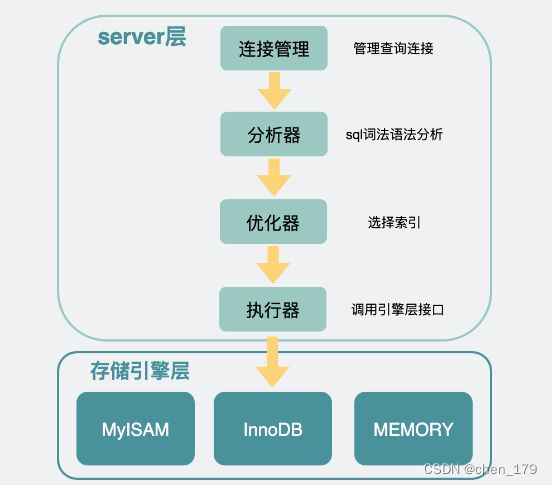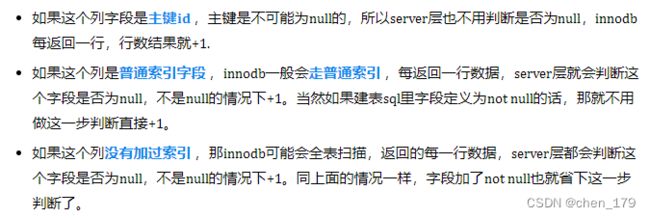阅读笔记lv.1
阅读笔记
- sql中各种 count
-
- 结论
- 不同存储引擎计算方式
- 区别
- count() 类型
- 责任链模式
-
- 常见场景
- 例子(闯关游戏)
sql中各种 count
结论
- innodb
count(*) ≈ count(1) > count(主键id) > count(普通索引列) > count(未加索引列)
-
myisam
有专门字段记录全表的行数,直接读这个字段就好了(innodb则需要一行行去算) -
如果确实需要获取行数,且可以接受不那么精确的行数(只需要判断大概的量级) 的话,那可以用explain里的rows,这可以满足大部分的监控场景,实现简单
-
如果要求行数准确 ,可以建个新表,里面专门放表行数的信息
-
如果对实时性要求比较高 的话,可以将更新行数的sql放入到对应事务里,这样既能满足事务隔离性,还能快速读取到行数信息
-
如果对实时性要求不高 ,接受一小时或者一天的更新频率,那既可以自己写脚本遍历全表后更新行数信息。也可以将通过监听binlog将数据导入hive,需要数据时直接通过hive计算得出
不同存储引擎计算方式
select count(*) from table (where *** );
当数据表小的时候,这是没问题的,但当数据量大的时候,比如未发送的短信到了百万量级 的时候,你就会发现,上面的sql查询时间会变得很长,最后timeout报错,查不出结果了 。
-
- 使用 myisam引擎 的数据表里有个记录当前表里有几行数据的字段,直接读这个字段返回就好了,因此速度快得飞起
-
- 使用innodb引擎 的数据表,则会选择体积最小的索引树 ,然后通过遍历叶子节点的个数挨个加起来,这样也能得到全表数据
区别
为什么innodb不能像myisam那样实现count()方法
-
最大的区别在于myisam不支持事务,而innodb支持事务
而事务,有四层隔离级别,其中默认隔离级别就是可重复读隔离级别(RR) -
- innodb引擎通过MVCC实现了可重复隔离级别 ,事务开启后,多次执行同样的select快照读 ,要能读到同样的数据。
-
- 对于两个事务A和B,一开始表假设就2条 数据,那事务A一开始确实是读到2条数据。事务B在这期间插入了1条数据,按道理数据库其实有3条数据了,但由于可重复读的隔离级别,事务A依然还是只能读到2条数据。
-
- 因此由于事务隔离级别的存在,不同的事务在同一时间下,看到的表内数据行数是不一致的 ,因此innodb,没办法,也没必要像myisam那样单纯的加个count字段信息在数据表上。
count() 类型
count方法的大原则是server层会从innodb存储引擎里读来一行行数据,并且只累计非null的值 。但这个过程,根据count()方法括号内的传参,有略有不同。
- count(*)
server层拿到innodb返回的行数据,不对里面的行数据做任何解析和判断 ,默认取出的值肯定都不是null,直接行数+1 - count(1)
server层拿到innodb返回的行数据,每行放个1进去,默认不可能为null,直接行数+1. -
- InnoDB 引擎遍历整张表,但不取值。server 层对于返回的每一行,放一个数字“1”进去,判断是不可能为空的,按行累加
- count(字段)
count(字段)是不统计,字段值为null的值 -
- count(主键 id) 来说,InnoDB 引擎会遍历整张表,把每一行的 id 值都取出来,返回给 server 层。server 层拿到 id 后,判断是不可能为空的,就按行累加
-
-
count(字段),server要字段,就返回字段,如果字段为空,就不做统计,字段的值过大,都会造成效率低下
由于指明了要count某个字段,innodb在取数据的时候,会把这个字段解析出来 返回给server层,所以会比count(1)和count(*)多了个解析字段出来的流程
-
责任链模式
- 责任链模式是一种行为设计模式, 允许你将请求沿着处理者链进行发送。收到请求后, 每个处理者均可对请求进行处理, 或将其传递给链上的下个处理者。
常见场景
- 多条件的流程判断(如导入文件校验条件较多,且需逐层校验成功的;或类似闯关游戏,必须达到一定分数/条件才能开始下一关)
导入功能可能【模板方法】更适合
-
- 模板方法可以提供大部分相同的【模板】,根据不同的导入场景做小部分调整,实现各自独立的业务,大体上导入功能差不多
-
- 一次性实现一个算法的不变部分,并将可变的行为留给子类来实现
- ERP 系统流程审批:总经理、人事经理、项目经理
- Java 过滤器的底层实现 Filter
例子(闯关游戏)
-
假设现在有一个闯关游戏,进入下一关的条件是上一关的分数要高于 xx:
-
游戏一共 3 个关卡
进入第二关需要第一关的游戏得分大于等于 80
进入第三关需要第二关的游戏得分大于等于 90
简易版(多层 if 逐层判断是否满足条件)
//第一关
public class FirstPassHandler {
public int handler(){
System.out.println("第一关-->FirstPassHandler");
return 80;
}
}
//第二关
public class SecondPassHandler {
public int handler(){
System.out.println("第二关-->SecondPassHandler");
return 90;
}
}
//第三关
public class ThirdPassHandler {
public int handler(){
System.out.println("第三关-->ThirdPassHandler,这是最后一关啦");
return 95;
}
}
//客户端
public class HandlerClient {
public static void main(String[] args) {
FirstPassHandler firstPassHandler = new FirstPassHandler();//第一关
SecondPassHandler secondPassHandler = new SecondPassHandler();//第二关
ThirdPassHandler thirdPassHandler = new ThirdPassHandler();//第三关
int firstScore = firstPassHandler.handler();
//第一关的分数大于等于80则进入第二关
if(firstScore >= 80){
int secondScore = secondPassHandler.handler();
//第二关的分数大于等于90则进入第二关
if(secondScore >= 90){
thirdPassHandler.handler();
}
}
}
}
- 实际上的 handle() 根据业务来传参及计算分数
- 缺点
当关数越多/条件越多时代码会变得很长,无限月读(if 嵌套)
if(第1关通过){
// 第2关 游戏
if(第2关通过){
// 第3关 游戏
if(第3关通过){
// 第4关 游戏
if(第4关通过){
// 第5关 游戏
if(第5关通过){
// 第6关 游戏
if(第6关通过){
//...
}
}
}
}
}
}
升级(责任链链表拼接每一关)
- 可以通过链表将每一关连接起来,形成责任链的方式,第一关通过后是第二关,第二关通过后是第三关… (减少客户端代码过多的 if 嵌套)
public class FirstPassHandler {
/**
* 第一关的下一关是 第二关
*/
private SecondPassHandler secondPassHandler;
public void setSecondPassHandler(SecondPassHandler secondPassHandler) {
this.secondPassHandler = secondPassHandler;
}
//本关卡游戏得分
private int play(){
return 80;
}
public int handler(){
System.out.println("第一关-->FirstPassHandler");
if(play() >= 80){
//分数>=80 并且存在下一关才进入下一关
if(this.secondPassHandler != null){
return this.secondPassHandler.handler();
}
}
return 80;
}
}
public class SecondPassHandler {
/**
* 第二关的下一关是 第三关
*/
private ThirdPassHandler thirdPassHandler;
public void setThirdPassHandler(ThirdPassHandler thirdPassHandler) {
this.thirdPassHandler = thirdPassHandler;
}
//本关卡游戏得分
private int play(){
return 90;
}
public int handler(){
System.out.println("第二关-->SecondPassHandler");
if(play() >= 90){
//分数>=90 并且存在下一关才进入下一关
if(this.thirdPassHandler != null){
return this.thirdPassHandler.handler();
}
}
return 90;
}
}
public class ThirdPassHandler {
//本关卡游戏得分
private int play(){
return 95;
}
/**
* 这是最后一关,因此没有下一关
*/
public int handler(){
System.out.println("第三关-->ThirdPassHandler,这是最后一关啦");
return play();
}
}
public class HandlerClient {
public static void main(String[] args) {
FirstPassHandler firstPassHandler = new FirstPassHandler();//第一关
SecondPassHandler secondPassHandler = new SecondPassHandler();//第二关
ThirdPassHandler thirdPassHandler = new ThirdPassHandler();//第三关
firstPassHandler.setSecondPassHandler(secondPassHandler);//第一关的下一关是第二关
secondPassHandler.setThirdPassHandler(thirdPassHandler);//第二关的下一关是第三关
//说明:因为第三关是最后一关,因此没有下一关
//开始调用第一关 每一个关卡是否进入下一关卡 在每个关卡中判断
firstPassHandler.handler();
}
}
- 缺点
从代码中可以看到,每一关的处理逻辑中都有一个 set**PassHandler() 方法,只是参数类型不一样,但是作用其实是一样的,只是用来判断是否有下一关
每个关卡中都有下一关的成员变量并且是不一样的,形成链很不方便,代码扩展性不行
进化(责任链改造—抽象)
- 每个关卡中都有下一关的成员变量并且是不一样的,那么我们可以在关卡上抽象出一个父类或者接口,然后每个具体的关卡去继承或者实现,将参数合并成一个,不再需要在各自的 set**PassHandler 中传递不同的参数
- 责任链设计模式的基本组成
-
- 抽象处理者(Handler)角色: 定义一个处理请求的接口,包含抽象处理方法和一个后继连接
-
- 具体处理者(Concrete Handler)角色: 实现抽象处理者的处理方法,判断能否处理本次请求,如果可以处理请求则处理,否则将该请求转给它的后继者
public abstract class AbstractHandler {
/**
* 下一关用当前抽象类来接收
*/
protected AbstractHandler next;
public void setNext(AbstractHandler next) {
this.next = next;
}
public abstract int handler();
}
public class FirstPassHandler extends AbstractHandler{
private int play(){
return 80;
}
@Override
public int handler(){
System.out.println("第一关-->FirstPassHandler");
int score = play();
if(score >= 80){
//分数>=80 并且存在下一关才进入下一关
if(this.next != null){
return this.next.handler();
}
}
return score;
}
}
public class SecondPassHandler extends AbstractHandler{
private int play(){
return 90;
}
public int handler(){
System.out.println("第二关-->SecondPassHandler");
int score = play();
if(score >= 90){
//分数>=90 并且存在下一关才进入下一关
if(this.next != null){
return this.next.handler();
}
}
return score;
}
}
public class ThirdPassHandler extends AbstractHandler{
private int play(){
return 95;
}
public int handler(){
System.out.println("第三关-->ThirdPassHandler");
int score = play();
if(score >= 95){
//分数>=95 并且存在下一关才进入下一关
if(this.next != null){
return this.next.handler();
}
}
return score;
}
}
public class HandlerClient {
public static void main(String[] args) {
FirstPassHandler firstPassHandler = new FirstPassHandler();//第一关
SecondPassHandler secondPassHandler = new SecondPassHandler();//第二关
ThirdPassHandler thirdPassHandler = new ThirdPassHandler();//第三关
// 和上面没有更改的客户端代码相比,只有这里的set方法发生变化,其他都是一样的
firstPassHandler.setNext(secondPassHandler);//第一关的下一关是第二关
secondPassHandler.setNext(thirdPassHandler);//第二关的下一关是第三关
//说明:因为第三关是最后一关,因此没有下一关
//从第一个关卡开始
firstPassHandler.handler();
}
}
- 从代码中可以看到,此次进化引入了一个 抽象处理者,让每一关的具体处理者都继承该类,后续在设置下一关对象的时候就不必各自编写各自的set**PassHandler() 方法,而是直接使用相同的处理方法,只需要编写各自的 handler() 得分方法,进一步简化了代码
终极进化(责任链工厂改造)
public enum GatewayEnum {
// handlerId, 拦截者名称,全限定类名,preHandlerId,nextHandlerId
API_HANDLER(new GatewayEntity(1, "api接口限流", "cn.dgut.design.chain_of_responsibility.GateWay.impl.ApiLimitGatewayHandler", null, 2)),
BLACKLIST_HANDLER(new GatewayEntity(2, "黑名单拦截", "cn.dgut.design.chain_of_responsibility.GateWay.impl.BlacklistGatewayHandler", 1, 3)),
SESSION_HANDLER(new GatewayEntity(3, "用户会话拦截", "cn.dgut.design.chain_of_responsibility.GateWay.impl.SessionGatewayHandler", 2, null)),
;
GatewayEntity gatewayEntity;
public GatewayEntity getGatewayEntity() {
return gatewayEntity;
}
GatewayEnum(GatewayEntity gatewayEntity) {
this.gatewayEntity = gatewayEntity;
}
}
public class GatewayEntity {
private String name;
private String conference;
private Integer handlerId;
private Integer preHandlerId;
private Integer nextHandlerId;
}
public interface GatewayDao {
/**
* 根据 handlerId 获取配置项
* @param handlerId
* @return
*/
GatewayEntity getGatewayEntity(Integer handlerId);
/**
* 获取第一个处理者
* @return
*/
GatewayEntity getFirstGatewayEntity();
}
public class GatewayImpl implements GatewayDao {
/**
* 初始化,将枚举中配置的handler初始化到map中,方便获取
*/
private static Map<Integer, GatewayEntity> gatewayEntityMap = new HashMap<>();
static {
GatewayEnum[] values = GatewayEnum.values();
for (GatewayEnum value : values) {
GatewayEntity gatewayEntity = value.getGatewayEntity();
gatewayEntityMap.put(gatewayEntity.getHandlerId(), gatewayEntity);
}
}
@Override
public GatewayEntity getGatewayEntity(Integer handlerId) {
return gatewayEntityMap.get(handlerId);
}
@Override
public GatewayEntity getFirstGatewayEntity() {
for (Map.Entry<Integer, GatewayEntity> entry : gatewayEntityMap.entrySet()) {
GatewayEntity value = entry.getValue();
// 没有上一个handler的就是第一个
if (value.getPreHandlerId() == null) {
return value;
}
}
return null;
}
}
public class GatewayHandlerEnumFactory {
private static GatewayDao gatewayDao = new GatewayImpl();
// 提供静态方法,获取第一个handler
public static GatewayHandler getFirstGatewayHandler() {
GatewayEntity firstGatewayEntity = gatewayDao.getFirstGatewayEntity();
GatewayHandler firstGatewayHandler = newGatewayHandler(firstGatewayEntity);
if (firstGatewayHandler == null) {
return null;
}
GatewayEntity tempGatewayEntity = firstGatewayEntity;
Integer nextHandlerId = null;
GatewayHandler tempGatewayHandler = firstGatewayHandler;
// 迭代遍历所有handler,以及将它们链接起来
while ((nextHandlerId = tempGatewayEntity.getNextHandlerId()) != null) {
GatewayEntity gatewayEntity = gatewayDao.getGatewayEntity(nextHandlerId);
GatewayHandler gatewayHandler = newGatewayHandler(gatewayEntity);
tempGatewayHandler.setNext(gatewayHandler);
tempGatewayHandler = gatewayHandler;
tempGatewayEntity = gatewayEntity;
}
// 返回第一个handler
return firstGatewayHandler;
}
/**
* 反射实体化具体的处理者
* @param firstGatewayEntity
* @return
*/
private static GatewayHandler newGatewayHandler(GatewayEntity firstGatewayEntity) {
// 获取全限定类名
String className = firstGatewayEntity.getConference();
try {
// 根据全限定类名,加载并初始化该类,即会初始化该类的静态段
Class<?> clazz = Class.forName(className);
return (GatewayHandler) clazz.newInstance();
} catch (ClassNotFoundException | IllegalAccessException | InstantiationException e) {
e.printStackTrace();
}
return null;
}
}
public class GetewayClient {
public static void main(String[] args) {
GetewayHandler firstGetewayHandler = GetewayHandlerEnumFactory.getFirstGetewayHandler();
firstGetewayHandler.service();
}
}
- 待深究
文




